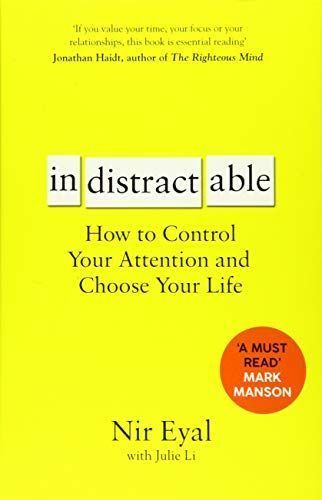
Indistractable How to Control Your Attention and Choose Your Life
'A must-read' MARK MANSON 'Exactly what most of us need in order to focus on what is important, rather than the dazzling, illuminated, unsatisfying distractions of modern life' MATT HAIG 'Does exactly as it promises. Amazing' CHRIS EVANS 'A guide to staying focused in an age of constant distraction' GUARDIAN 'Eyal argues with impeccable logic' THE TIMES 'Masses of really useful arsenal and some very interesting studies about how to be less distracted in the world' PANDORA SYKES 'Now there's a way we can regain our ability to focus' RED ___________________________ We are living through a crisis of distraction. Plans get sidetracked, friends are ignored, work never seems to get done. Why does it feel like we're distracting our lives away? In Indistractable, behavioural designer Nir Eyal shows what life could look like if you followed through on your intentions. Instead of suggesting a digital detox, Eyal reveals the hidden psychology driving you to distraction, and teaches you how to make pacts with yourself to keep your brain on track. Indistractable is a guide to making decisions and seeing them through. Empowering and optimistic, this is the book that will help you design your time, realise your ambitions, and live the life you really want.
Reviews
Heiki Riesenkampf@hrk
Nenad Nikolic@nnikolic72
Scott Wilson@createpei
Keven Wang@kevenwang
Fred Rivett@fredrivett
Nick Gracilla@ngracilla
Felipe Saldarriaga @felipesaldata
Raúl Barroso Moreno@raulb
Lee Herman@macbikegeek
Tarlan Asadli@tarlansd
Omar@omareduardo
Arjun@arjun
Ilia Markov@ilia
Clint Bedwell@clintbedwell
Huzefa Chabukswar@huzefa
Phil K@readmorebooks
Masharty Tembo@masharty
Eduardo Z @eduardozulian
Gerbert-Jan@gjrosmalen
Christian Bager Bach Houmann@cbbh
Niels Andersen@nielsandersen
Taylor Murphy@tayloramurphy
Pierre@pst
veekay@veekay